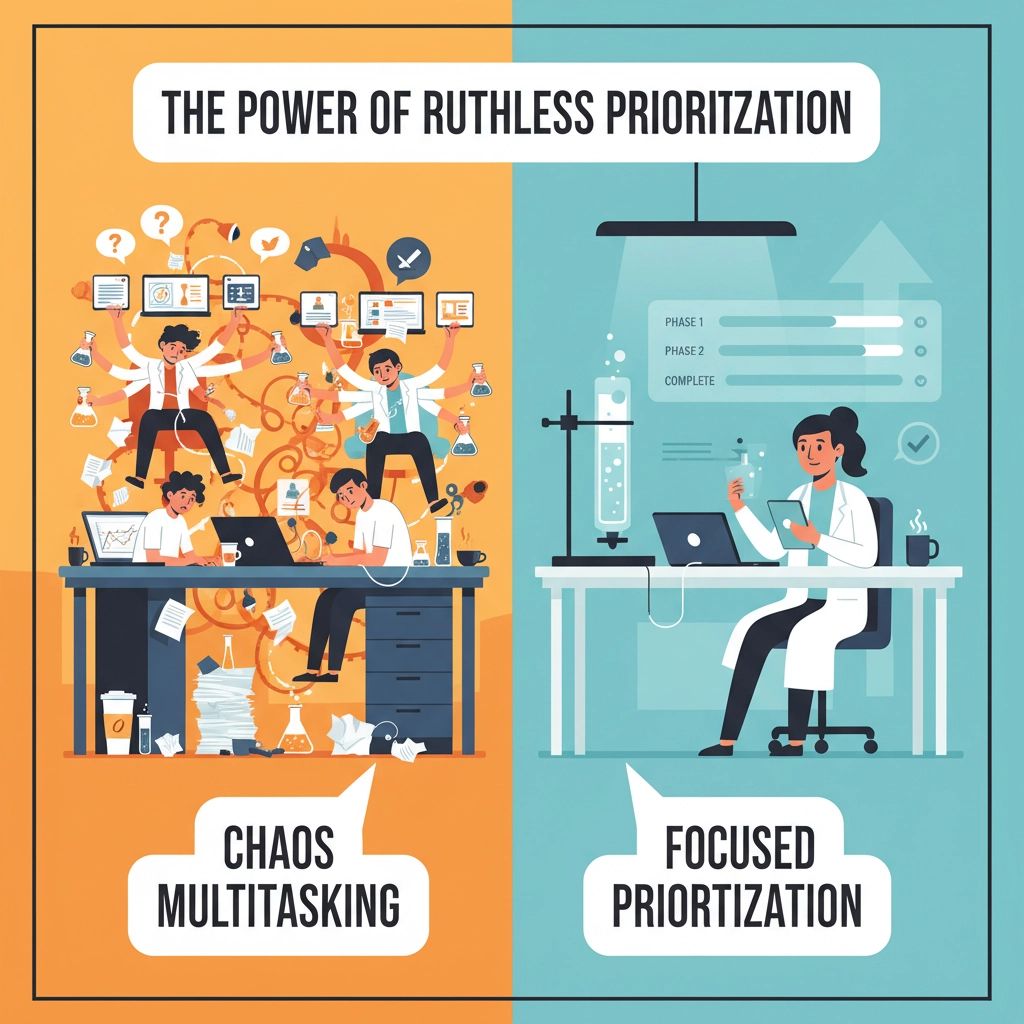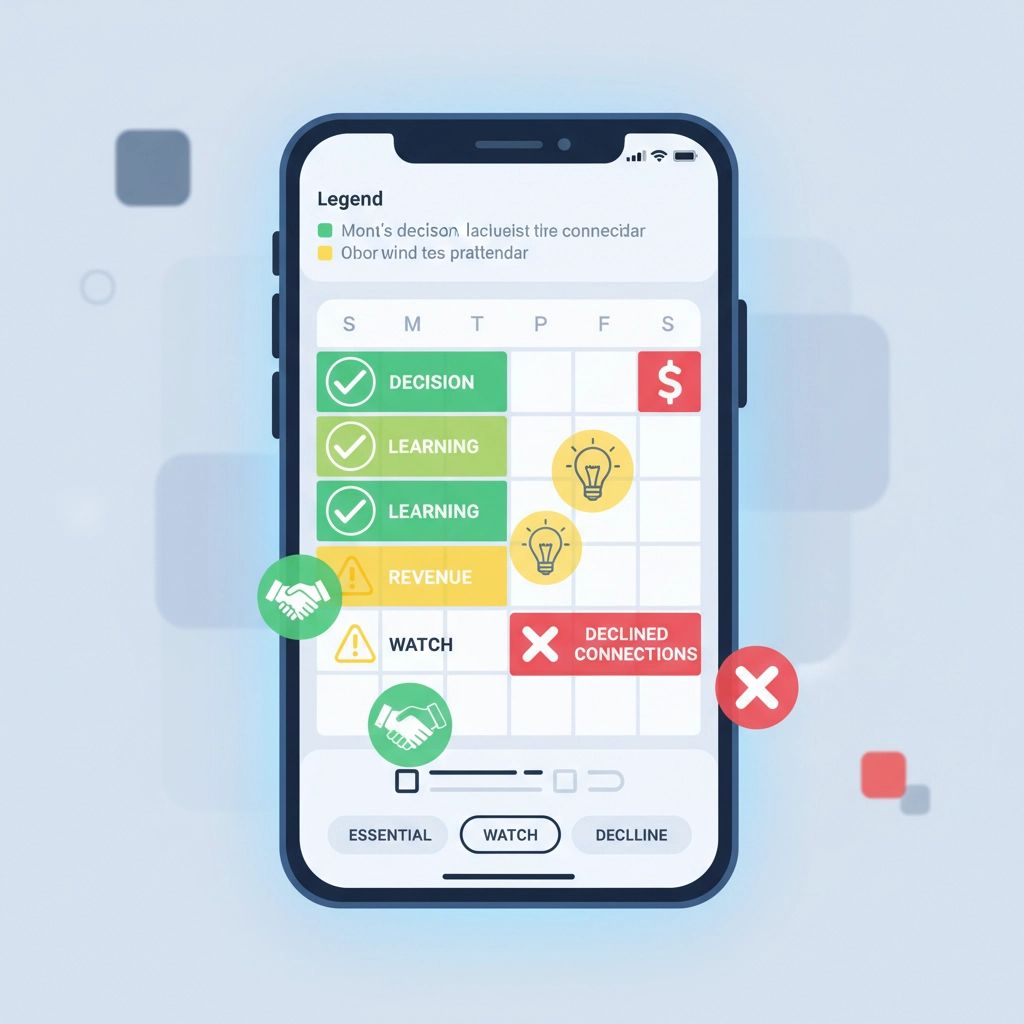The Power of Saying No: How Deeptech Founders Gain Clarity by Ruthless Deletion, Declining, and Firing
Oct 28, 2025
Here's what most deeptech and healthtech founders get backwards: they think growth comes from saying yes to more opportunities. In reality, breakthrough companies are built on the disciplined art of saying no.
I've watched too many brilliant technical founders burn through runway chasing every promising lead, taking every investor meeting, and keeping underperforming team members "just a bit longer." Meanwhile, their focused competitors, often with less technical prowess, race ahead by ruthlessly eliminating everything that doesn't serve their core mission.
The difference isn't talent or funding. It's clarity. And clarity comes from three specific practices: deleting failed experiments, declining time-wasting commitments, and firing people who don't fit.
Why "No" Is Your Most Important Strategic Tool
In deeptech and healthtech, the stakes of unfocused execution are uniquely high. Unlike software startups that can pivot overnight, your regulatory submissions lock in compound choices for months. Your lab equipment purchases commit capital for years. Your key hires determine technical capabilities for entire product cycles.
Every yes you give to the wrong thing isn't just a missed opportunity, it's an active step away from product-market fit. As one Capital Catalyst founder put it: "I spent six months saying yes to partnership meetings before I realized I was literally paying people to distract me from building."

The Three Pillars of Strategic No
Pillar 1: Ruthless Deletion (Projects & Experiments)
Most deeptech founders understand intellectually that 80% of experiments will fail. But emotionally? They treat every failing experiment like a child who just needs more time to walk.
The Experiment Graveyard Framework:
Every month, audit your active projects using these three questions:
- Learning velocity: Are we learning faster than we're burning cash?
- Mission alignment: Does this directly advance our core hypothesis?
- Resource efficiency: Could these resources produce better outcomes elsewhere?
If any experiment fails two of three criteria, it goes to the graveyard. No exceptions.
Take the example from Loyal, a longevity biotech company. They invested heavily in DNA kit distribution to customers, "multiples more expensive than our healthspan study, and we learned multiples less." The founder's lesson? "Building in redundancies meant we could absorb these failures without them becoming fatal."
Your Action Item: Create a monthly "experiment audit" calendar reminder. Use a simple spreadsheet with three columns: Keep, Watch, Kill. Be honest about what's actually working.
Pillar 2: Strategic Declining (Meetings & Opportunities)
The average founder spends 23 hours per week in meetings. For deeptech and healthtech founders, this is particularly deadly because your technical progress happens in deep work blocks, not conference rooms.
The Meeting Audit System:
Before accepting any meeting, run it through this filter:
- Decision meetings: Will this result in a clear go/no-go decision?
- Learning meetings: Will I gain specific technical or market knowledge?
- Revenue meetings: Will this directly advance a sale or partnership?
Everything else is a "connection" meeting, and connection meetings are how runway dies.

Founder-Tested Scripts:
For investor meetings when you're not actively fundraising:
"Thanks for reaching out. We're heads-down on technical milestones until Q2. Can we reconnect then when we'll have more meaningful traction to discuss?"
For partnership exploration calls:
"I'd love to explore this when we're ready for partnerships in [specific timeframe]. Could you send over your standard partnership framework so I can review when the timing aligns?"
For "coffee to pick your brain" requests:
"I'm not taking coffee meetings this quarter, but here's a [blog post/resource] that might help with your question."
Pillar 3: The Fire-Fast Philosophy (People & Roles)
This is where most technical founders struggle most. You hired someone with impressive credentials, they're working hard, they're a good person, but they're not moving the needle.
In deeptech and healthtech, a single wrong hire for a critical role can inflict strategic damage that's irreversible within your runway. The fire-fast philosophy isn't about being harsh, it's about being honest about what your startup actually needs to survive.
The 90-Day Performance Framework:
Every new hire gets three clear metrics they must hit by day 90:
- Technical output: Specific deliverables completed
- Integration success: How well they've meshed with existing team dynamics
- Mission acceleration: Measurable impact on core company objectives
If they're missing two of three by day 90, it's time for the conversation. Not day 120. Not "let's give it another quarter." Day 90.

The Emotional Reality of Strategic No
Here's what nobody tells you: saying no will feel terrible at first. You'll worry you're missing opportunities, burning bridges, being too harsh. This is normal and temporary.
What's not temporary is the compound benefit of focus. When you stop saying yes to everything, you create space for the right things. Your team starts executing faster. Your technical progress accelerates. Your fundraising conversations get more precise.
As covered in our previous post on strategic detachment, the best founders stay emotionally attached to their mission while remaining ruthlessly objective about their methods.
Your 30-Day "No" Implementation Plan
Week 1: Audit existing commitments
- List all recurring meetings, ongoing experiments, and current team members
- Rate each on mission-criticality (1-10 scale)
- Schedule "kill meetings" for anything below 7
Week 2: Install your filtering systems
- Create templates for common "no" scenarios
- Set up the monthly experiment audit process
- Establish 90-day performance metrics for current team
Week 3: Practice saying no
- Decline at least three non-essential meetings
- Kill one underperforming experiment
- Have honest performance conversations with struggling team members
Week 4: Measure the results
- Calculate hours reclaimed from meeting declines
- Assess resource reallocation from killed experiments
- Document improvements in team focus and technical progress
The Compounding Returns of Clarity
The founders who master strategic no don't just survive: they create sustainable competitive advantages. While their competitors chase every opportunity, these focused teams compound technical progress, build stronger partnerships, and tell clearer stories to investors.
Remember: in deeptech and healthtech, you're not just competing for market share: you're racing against time, regulatory cycles, and capital efficiency. The power to say no isn't about limitation. It's about directing all your considerable technical talent toward the few things that actually matter.
Your breakthrough isn't hiding in the meeting you haven't taken yet. It's waiting in the focused execution you haven't started yet.